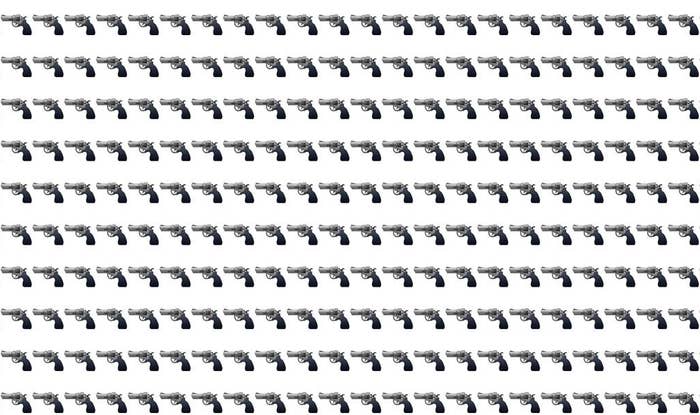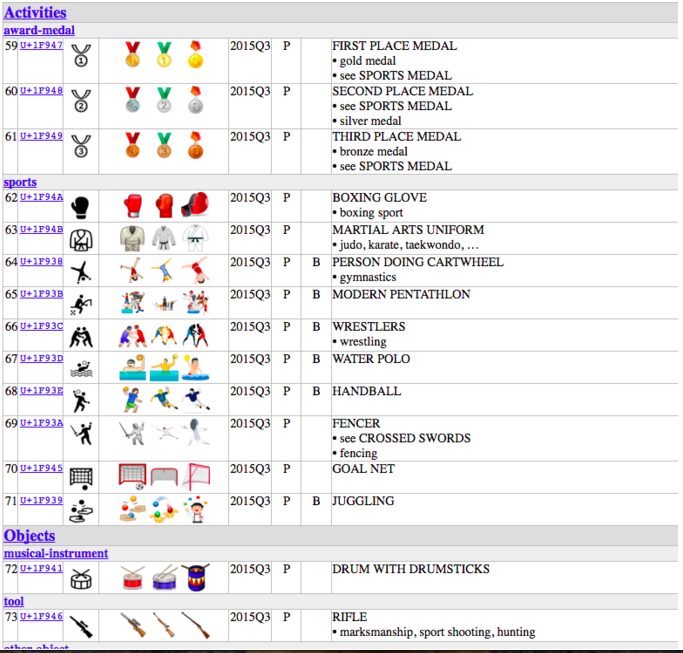
You can currently purchase a semi-automatic rifle in a major U.S. city in just seven minutes, but don’t expect to text someone a rifle emoji anytime soon.
Unicode, the technical organization in charge of selecting and overseeing emojis, debated and ultimately decided to remove a rifle from its list of new emoji candidates in 2016, according to multiple persons who attended its quarterly meeting last May. The decision was led and championed by one of tech's biggest companies: Apple.
Apple is one of Unicode's largest member companies and not only has voting rights, but also holds considerable influence. Millions of people use emojis on Apple’s software platforms (earlier this year, the company announced it delivers as many as 200,000 messages per second across iMessage).

According to sources in the room, Apple started the discussion to remove the rifle emoji, which had already passed into the encoding process for the Unicode 9.0 release this June. Apple told the consortium it would not support a rifle on its platforms and asked for it not to be made into an emoji. "I heard Apple speak up about it and also Microsoft," one member present at the discussions told BuzzFeed News.
This is a somewhat unusual decision, as most accepted candidates get approval to become full-fledged emojis. However, the member said the debate wasn't all that contentious, perhaps because a handgun emoji was encoded into the original emoji release. "Nobody in the room seemed to mind not encoding the rifle." The other candidate the consortium rejected during the meeting was "modern pentathlon," which depicts a man firing a pistol.
Though it was a unanimous decision, Unicode members are reluctant to talk about the rifle. Apple declined to comment on the company’s involvement in the decision, and a dozen Unicode members declined to speak about the discussions. When reached for comment, Unicode President Mark Davis confirmed the move but, in keeping with the cryptic organization, refused to elaborate on the reasons why. "The committee decided not to mark them as Emoji, but to add them as characters (that is, normal black & white symbols)," he wrote in an email to BuzzFeed News. Like nearly everything Unicode does, the decision is technical and complicated, but essentially, this just means that a rifle will show up in the official Unicode Character Database but will not appear on any standard emoji keyboard.

The rifle appeared to be part of a set of Olympics-themed emojis (rifle shooting is an Olympic sport), intended to coincide with this year's games in Rio, alongside emojis like "gymnastics," "handball," "water polo," "person doing cartwheel," and a series of gold, silver, and bronze medals. An archived page of 2016 emoji candidates on Unicode's website included the rifle as recently as April 11 of this year and showed three different versions of the gun, including one with a scope and multiple colors. The archived Unicode page describes the different possible use cases for the rifle as "marksmanship," "sport shooting," and "hunting."
Soon after it was announced, the rifle was protested by a British gun control group, which told the BBC, “It would be familiarising and popularising the image of a weapon which is not a good idea.” Unicode President Mark Davis responded to criticism in the New York Times, noting, “Some people are bothered by the inclusion of the rifle as a candidate, but the reason that’s included is because shooting is an Olympic sport.”

While Unicode's rifle debate is a far cry from any actual policy discussion, regulating emojis based on their potential controversy is further evidence of the broad, unexpected influence of tech’s biggest companies. Many inside Unicode disagree that emoji rises to the level of an emerging language, but there's little debate that it has quickly become a meaningful, global form of expression and communication. And Unicode, which includes Apple, Google, and Microsoft among its voting members, is in the precarious position of governing emoji’s evolution. For those wary of Big Tech's outsize power, this is another troubling example.
"In a weird, maybe almost unexpected way, emoji thrusts Unicode into contentious political and religious discussions," one member present at last May's meetings said recently over the phone. However cartoonish they may look, emoji representation — or lack thereof — are often stand-ins for serious issues and thrust Unicode's engineers into the spotlight. In July 2015, Microsoft made its own call to include a middle finger emoji, which lead to a barrage of criticism from outlets who saw the glyph as lewd.
Multiple Unicode members told BuzzFeed News that while the vast majority of its emoji decisions are unanimous, the significant influence tech companies hold is understandable. "These are the companies who are having to encode them and then update their software. They're doing the most work. It makes sense for them to say, ‘at least one of us should be willing to support this to move forward.’"
There's even a recent proposal on the table in the consortium that would require the major emoji vendors, like Apple, Google, and Microsoft, to support the adoption and "wide deployment" of an emoji in order to make it an approved candidate — a move that would theoretically give more control to Unicode's most influential members. (There are only 12 full voting members, and they include Oracle, Facebook, Google, Apple, Oracle, IBM, and Yahoo.)
"I think what we're seeing here with the rifle, is these big vendors and tech companies truly realizing what a big deal these emojis are," the Unicode member said. Indeed, the unicode proposal for "wide deployment," co-authored by representatives from Microsoft, Apple, and Google, seems to echo this frustration. "There is more public awareness of [emojis]: more public pressure to implement them, but also more public scrutiny of them. Hence, it makes sense to first make sure that there is reasonable commitment to significant support before encoding," the proposal reads.
The answer is of course 'no' - BBC News - Do smartphones need a hunting rifle emoji? http://t.co/PuR9dz4X5z #emoji
Full voting members are now aware that the companies will likely see criticism on controversial emojis, no matter how they vote. As one member told BuzzFeed News, "they need more time to prepare for the storm, whatever way it goes.”
Gun control issues aside, the rifle debate and the middle finger emoji backlash highlight one of Unicode's enduring tensions: that this highly technical group has unexpectedly been tasked with building what some see as the first digital universal language.
"We're talking about engineers that are concerned about standards and internationalization issues who now have to do something more in line with Apple or Google's marketing teams," one newer Unicode member told BuzzFeed News of the rifle decision. "It is a bizarre and unusual situation."
